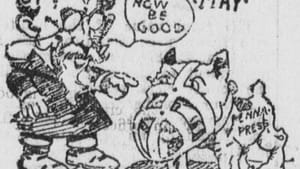Stay in the Loop
BSR publishes on a weekly schedule, with an email newsletter every Wednesday and Thursday morning. There’s no paywall, and subscribing is always free.
Dreck, lies, and audiotape
NPR won't chase a presidential lie

I ran into a most interesting article by Richard Gonzalez at National Public Radio (NPR). The radio network has decided not to refer to certain Trump-team declarations as “lies.”
The report that generated NPR’s decision was made by correspondent Mary Louise Kelly on the January 23, 2017, broadcast of Morning Edition. She discussed President Trump’s visit to CIA headquarters, where he repeated his whopper about the inauguration crowd's size more than once. Two days later, NPR posted Gonzalez’s essay.
NPR’s senior vice president for news, Michael Oreskes, said that “NPR has decided not to use the word ‘lie’ and that Kelly got it right by avoiding that word.” Here is a transcript of Kelly’s report.
I also found audio on WHYY’s site of Marty Moss-Coane’s January 23, 2017, episode of Radio Times (broadcast the same day as Kelly’s report), under the header: The Aisles Have Eyes; first, Spicer's lies. In that broadcast, Moss-Coane interviewed Washington Post national political correspondent Karen Tumulty, and both women freely used the word “lie” in discussing this knotty problem in journalistic practice. Tumulty specifically refers to the concept of intent, which is part of NPR’s rationale in barring the use of the "nasty term" (per Gonzalez): A lie involves “intent.” That word is in Gonzalez’s headline.
This should concern WHYY listeners, since Moss-Coane, long a fixture on our airwaves, apparently might now be forced to self-censor. Will she use the “L-word”? And what’s next? Does “falsehood,” another term Moss-Coane and Tumulty used on that episode -- and one ordinarily understood as a synonym for “lie” -- also have to involve intent?
Declaring intent
Let’s focus on what’s wrong with NPR’s new policy with the hope that it can be reconsidered, or at least given an asterisk.
“Intent” is a slippery matter. (I feel, here, as though I’m suddenly in a Catholic grade-school class, debating the definition of sin.) Those journalists who are free to do so are already out in the field or in their studios repeatedly shouting “Lie!” at various intransigent talking heads. I’d like to suggest to NPR that the following strikes me as both true and defensible: Repeating a falsehood in the face of overwhelming credible evidence to the contrary establishes the intent to lie – to “gaslight,” to put up a smokescreen, to advance the Big Lie until it’s accepted by more and more people. It doesn’t matter if you’re talking about crowd size, five million illegal voters, or an employment rate that’s “really 28 percent.”
Another defense Oreskes advanced for his new policy is, “The minute you start branding things with a word like 'lie,' you push people away from you." Michael, Michael, Michael. Those people you’re worrying about pushing away are not listening to NPR, and at this juncture are very, very unlikely to start. This is a red herring.
Finally, though, what is most disturbing about this capitulation is that it demonstrates that the infant Trump administration actually is -- now, already, just one week in -- having a chilling effect on journalistic practice. Worse, they’ve done it with the most outrageous L-words: declarations that aren’t even close to the truth.
Sign up for our newsletter
All of the week's new articles, all in one place. Sign up for the free weekly BSR newsletters, and don't miss a conversation.

 Rick Soisson
Rick Soisson